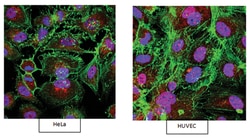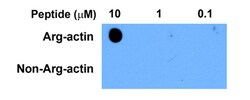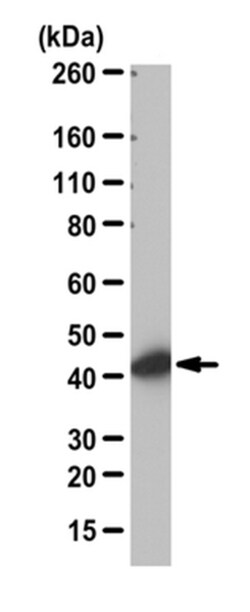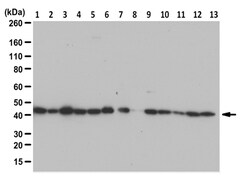Promotional price valid on web orders only. Your contract pricing may differ. Interested in signing up for a dedicated account number?
Learn More
Learn More
MilliporeSigma™ anti-beta Actin, Polyclonal
Rabbit Polyclonal Antibody
Supplier: MilliporeSigma™ ABT264
Description
Specifically detects beta Actin Clone: in Human, Mouse, Rat samples, and it is validated for Immunocytochemistry, Western Blotting
Actin, cytoplasmic 1 (UniProt P60709; also known as beta-actin, PS1TP5-binding protein 1) is encoded by the ACTB (also known as BRWS1, PS1TP5BP1) gene (Gene ID 60) in human. Post-translational protein arginylation is mediated by Arg–transfer RNA (-tRNA) protein transferase (Ate1; arginyltransferase).β- andγ-actins are the major structural components of the actin cytoskeleton in nonmuscle cells. Despite their similarity, theβ-, but not theγ-, actin is N-terminally arginylated in vivo, where the first two N-terminal amino acids are removed and replaced with an arginine (from NH2-MDDDIAAL- to NH2-RDDIAAL-). In the absence of arginylation, actin forms aggregates during cell-free polymerization. Fibroblasts derived from Ate1 knockout (KO) mice show collapsed lamella, which can be rescued by reintroducing N-terminally arginylatedβ-actin into the Ate1 KO cells. Intracellular actin polymer levels are shown to drastically decrease in arginylation-deficient cells, which results from changes in actin polymerization properties.
Specifications
| beta Actin | |
| Polyclonal | |
| Purified rabbit polyclonal antibody in buffer containing 0.1M Tris-Glycine (pH 7.4), 150mM NaCl with 0.05% sodium azide. | |
| ACTB | |
| C-terminally KLH-conjugated linear peptide corresponding to human beta-actin N-terminal sequence with arginylation modification. | |
| 100 μg | |
| Cell Structure | |
| NP_001092 | |
| Human, Mouse, Rat |
| Immunocytochemistry, Western Blot | |
| Unconjugated | |
| P60709 | |
| Rabbit | |
| Affinity Purified | |
| RUO | |
| Primary | |
| This polyclonal antibody detects beta-actin posttranslationally modified by the removal of Met1 and Asp 2 and the arginylation of Asp3. This antibody does not react with beta-actin with unmodified N-terminus. | |
| 2°C to 8°C for one year |
Product Content Correction
Your input is important to us. Please complete this form to provide feedback related to the content on this product.
Product Title
For Research Use Only
Spot an opportunity for improvement?Share a Content Correction



